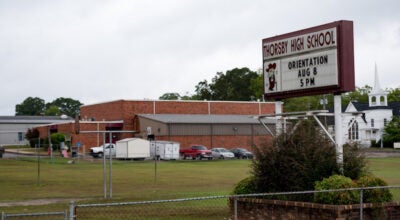Aftershocks of financial crisis felt in state
Published 1:41 pm Sunday, October 5, 2008
MONTGOMERY – Alabama is taking a hit from the nation’s financial crisis, which has lowered the value of state pension fund, reduced earnings in a plan to send students to college and eaten up more than $100 million of a state budget that pays for prisons, state troopers and Medicaid.
But state officials said the long-term financial outlook of these government operations is still sound.
The most obvious impact could be to the Retirement System of Alabama. The pension fund’s values are down 8 percent to 12 percent because of the turmoil on Wall Street. The pension funds total about $32 billion.
But the RSA’s chief executive officer, David Bronner, said the Alabama fund is in better shape than most because of a conservative and diversified investment plan. RSA has invested in or owns golf courses across Alabama, newspapers and broadcast stations and even a large New York City office building.
“The different investments help in a huge way,” Bronner said.
He also said the losses this year follow the RSA’s gains of about 17 percent the previous year.
Also helping is that Alabama has very little invested in mortgages, the source of much of the financial turmoil, Bonner said. RSA got out of the real estate market in the 1980s after losing money when many homeowners rushed to refinance their mortgages, he said.
Meanwhile, state Treasurer Kay Ivey said two programs to help families save money to send their children to college have dropped 7 percent, but over the past five years showed gains ranging from 9.9 percent to 17 percent.
The programs are the Prepaid Affordable College Tuition Plan, which allows parents to put money into the plan’s investment portfolio when a child is young to pay for four years of college tuition in the future, and the Alabama Higher Education 529 Fund, which allows parents to invest money and use the proceeds to pay college expenses.
“The college savings plan is very dependent on the market,” Ivey said. “When the market goes up, it’s great. When the market comes down, it’s not so great.”
Another victim of the economic meltdown is the state General Fund budget, which provides money for most non-education services, including Medicaid, state troopers and prisons. The bad news is related to the volatile stock market that has been on a downward track.
The General Fund budget approved by the Legislature for fiscal 2009, which began Oct. 1, included $117 million in capital gains that State Finance Director Jim Main and lawmakers had hoped the state would make on investments from an oil and gas revenue savings account. But those gains have disappeared this year. Also, during the 2008 fiscal year, the interest income on state deposits, which go into the General Fund, dropped by $54 million.
Main said part of the missing $117 million will be made up by about $49 million that state agencies managed to save from the previous fiscal year.
Ivey, who as treasurer oversees state deposits, said the state’s interest income has been hurt by falling interest rates during the past year.
She said state law requires that the interest on state deposits be tied to the rate for Treasury bills.
“It’s sort of an antiquated law. Some states are allowed to competitively bid interest on state deposits,” Ivey said. She said she expects the interest rates to go back up when the economy recovers.






